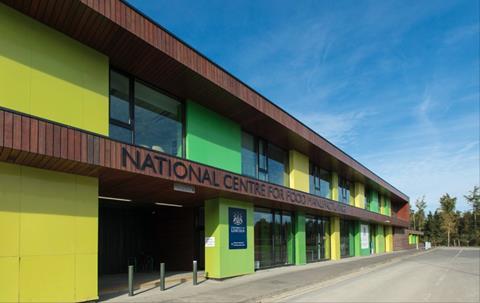
Thorvald is a field robot that can be used as a lightweight robotic carrying platform, to support fruit pickers for example, as a sensor platform to monitor crops and soils and, potentially, as a way of managing crops and for precision weed control.
That’s just the tip of the iceberg – soft robotic grasping tools and manipulators are being developed to handle food, a fully automatic robotic broccoli harvesting system is using cutting-edge 3D camera technology, and robotic weeding technologies are on the cards.
It might sound like the stuff of sci fi, but such innovations are already in development at the University of Lincoln’s National Centre for Food Manufacturing (NCFM), which is also training a whole generation of new entrants in disciplines from robotics and automation to food safety, nutrition, microbiology, processing technology and supply chain development.
It’s welcome news at a time when there are real fears over where the next generation of fresh produce scientists and technical staff are coming from, and offers relief from the regular stories of despair around recruitment and scientific funding.
NCFM is unusual among both educational and research facilities. A specialist dedicated campus focused on the food industry, it is funded equally by research and education, presenting a unique offer of research-led teaching. Taking on many Innovate UK and other projects (see box, opposite), NCFM collaborates as a partner, meaning its work is tailored to exactly what the industry requires. With a location in the heart of Lincolnshire, that inevitably means a strong focus on fresh produce.
According to Sharon Green, deputy head with responsibility for apprenticeship and business development, automation and food waste are key areas for the fruit and vegetable industry, and companies also tend to use NCFM’s expertise for micro analysis of field results, sensory valuation and shelf-life testing, among other things. Further mini projects include, for example, an onion producer using the facility’s tenderometer to analyse their crops.
“If you count small business-type projects along with the research projects led here, you are probably looking at 30 at a time if not more,” Green notes. “We collaborate with so many people.”
A genuine example of an end-to-end educator, on the campus there is a primary school, secondary school, further and higher education and post-graduate courses – a position Green believes is unique anywhere in the country. In total, there are some 1,800 students either on a short course or a longer programme such as an apprenticeship.
That makes for a well-mapped pathway for getting fresh faces into the industry, and comes at a time of opportunity with the recent introduction of the Apprenticeship Levy. “When the levy kicked in, what the government wasn’t expecting was that industry would not only embrace it, but start looking at a lot of higher-level skills,” says Green. “It’s practically decimated level 2 apprenticeships, but what’s happened is a phenomenal growth of higher and degree-level apprenticeships. We’ve got 95 higher and degree-level apprenticeships that we’ve recruited this year alone.
“If you look at our HE base in total we’ve got about 140 students at the moment, whereas if you look at other universities they are struggling to take on more than 10 or 12 full-time learners into traditional food science or technology routes a year.”
NCFM currently offers four degree apprenticeships – in food science and technology, operations management, supply chain and agri-produce, with food engineering set to be added in September. There are also four higher apprenticeships (in the same subjects), as well as further education level 2 and 3 apprenticeships.
The University of Lincoln as a whole is geared up to find new solutions for the production issues of tomorrow. Alongside NCFM, Lincoln Institute for Agri-Food Technology (LIAT) is specialising in improving productivity, efficiency and sustainability through innovation, and is currently focused on everything from 3D imaging and automation to harvesting and weeding technology, and the genetic code of foodborne pathogens.
All this focus on new technology does not mean workers should worry that they are all going to be replaced, according to Mathew Thompson, business development manager at NCFM. “It’s also giving people the skills so they can upskill and work alongside [technology],” he points out. That’s particularly true as students are given a wide grounding in both practical and theoretical work. “We have an innovative style of learning – a combination of workplace and classroom,” Thompson adds. “So there are block release periods for students to come here, access micro and chemistry labs, sensory assessment facilities and so on. And we have pilot plant facilities. So an entrepreneur might have a great idea to launch a product, and we have pilot plant facilities where they can do testing and research around that while they grow their business at the same time and use that as a catalyst to go onto the next stage.”
As a breeding ground for future industry expertise, the University of Lincoln would appear to be at the forefront of taking care of a wide-range of staff-sourcing needs, and that is very welcome news indeed.
In development
A selection of current projects being run by the Lincoln Institute of Agri-Food Technology
• Development of autonomous mushroom-picking robot (Innovate UK)
• Genetic and environmental interaction, poinsettia production and shelf life (HDC)
• Third-generation polyethylene greenhouse cladding materials (Innovate UK/BBSRC)
• Development and demonstration of an automated selective broccoli harvester (AHDB)
• 3D vision-assisted robotic harvesting of broccoli (BBSRC/Innovate UK)
• Laser-based sensing technology for improved control of spraying booms for agricultural spraying vehicles (Innovate UK/BBSRC Spark Award)
• Creating new multi-purpose imaging technology to automate quality inspection tasks in food processing and packaging (Technology Strategy Board)



